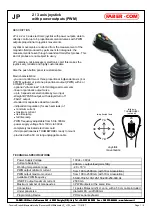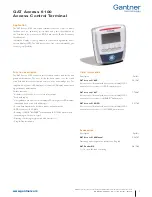
7
2. Installation Instructions
2.1 General Installation Notes
Please read the entire installation instructions to get familiar with the installation
steps before installation.
Be very careful when installing the batteries, especially flooded lead-acid battery.
Please wear eye protection, and have fresh water available to wash and clean any
contact with battery acid.
Keep the battery away from any metal objects, which may cause short circuit of the
battery.
Explosive battery gases may come out from the battery during charging, so make
sure ventilation condition is good.
Ventilation is highly recommended if mounted in an enclosure. Never install the
controller in a sealed enclosure with flooded batteries! Battery fumes from vented
batteries will corrode and destroy the controller circuits.
Loose power connections and corroded wires may result in high heat that can melt
wire insulation, burn surrounding materials, or even cause fire. Ensure tight
connections and use cable clamps to secure cables and prevent them from swaying
in mobile applications.
Lead-acid battery and lithium battery are recommended, other kinds please refer to
the battery manufacturer.
Battery connection may be wired to one battery or a bank of batteries. The following
instructions refer to a singular battery, but it is implied that the battery connection
can be made to either one battery or a group of batteries in a battery bank.
Multiple same models of controllers can be installed in parallel on the same battery
bank to achieve higher charging current. Each controller must have its own solar
module(s).
Select the system cables according to 5A/mm
2
or less current density in accordance
with Article 690 of the National Electrical Code, NFPA 70.
2.2 PV Array Requirements
(1)
Serial connection (string) of PV modules
As the core component of PV system, controller could be suitable for various types of
PV modules and maximize converting solar energy into electrical energy. Accordingto
the open circuit voltage (V
oc
) and the maximum power point voltage (V
Mpp
) of the
MPPT controller, the series number of different types PV modules can be calculated.
The below table is for reference only.
Summary of Contents for MAX-M2024
Page 1: ...MPPT Solar Charge Controller User Manual Models MAX M2024 MAX M3024 MAX M4024 ...
Page 31: ...28 Annex II Dimensions MAX M2024 Unit mm 28 ...
Page 32: ...29 MAX M3024 Unit mm 29 ...
Page 33: ...30 MAX M4024 Unit mm 30 Any changes without prior notice Version number 1 0 ...
Page 34: ...Conheça toda nossa linha de controladores de carga ...











































